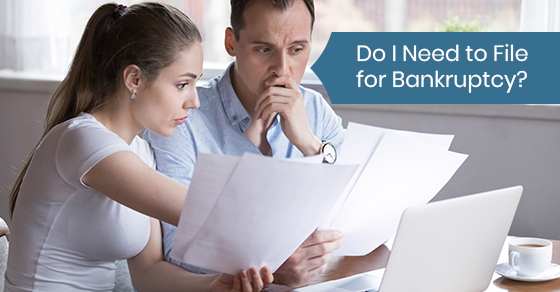
Do I Need to File for Bankruptcy?
Living with debt is stressful and can impact your life in many negative ways. From a bad credit score that can keep you from making major purchases such as a home or vehicle to ongoing pressure to pay your bills, debt is a burden that can make it impossible to relax.
When struggling with debt, many Canadians don’t realize there are options that will help relieve the stress. These can range from coming up with a more manageable payment plan, to setting a suitable budget, to consolidating your debt, to even filing for bankruptcy. However, knowing whether you need to file for bankruptcy or not can be confusing. Here we look at bankruptcy, what it means, and when it’s your best option.
What is bankruptcy?
Bankruptcy is the process in which you work with a Licensed Insolvency Trustee.
It’s not necessary to give up things such as your home or car in most cases, as instead, it’s designed to find the best way to pay back debt fairly.
In most cases, full balances for your unsecured debt are forgiven, and you eliminate interest for other debts. Bankruptcy can reduce the stress of your financial burdens, putting an end to collection calls and providing a way for you to pay off your debt in a manageable way.
This means no more garnisheeing of wages or having legal action being taken against you. Your trustee will work on your behalf to manage your finances and get you back on track to financial stability.
Bankruptcy is not designed as a way out from paying your debt. Rather, it’s designed for people who have come into debt through no fault of their own due to a loss of income
Is bankruptcy my only option?
No. Other steps can be considered before filing bankruptcy, including:
- Debt consolidation
If you still have a respectable credit score, debt consolidation allows you to seek a single consolidation loan. This will be used to pay off all your current debt in one lump sum to each of your creditors.
It is one single monthly payment to pay off your consolidation loan, making payments more manageable while also improving cash flow in most cases.
- Consumer proposal
A consumer proposal allows you to work with our Licensed Insolvency Trustees to come up with a proposal we present to your creditors on your behalf. The proposal includes terms that make it easier for you to pay off your debt, which might include putting an end to interest or negotiating a smaller payout than your current balance. This puts an end to collection calls and provides you with a way to pay off your debt quickly.
If these options are not available, we look at bankruptcy.
Should I file for bankruptcy?
The circumstances for filing for bankruptcy are unique to each case. However, the most common indicators that point to you considering personal bankruptcy include:
- You have experienced a loss of income that makes paying your debt impossible
- Your debt is too great to manage even though you are making the payments
- You are living off credit for even your daily expenses such as groceries and gas
- Your debt is unmanageable and is causing a sense of hopelessness, extreme stress, lack of sleep and a threat to your wellness
- You have unsuccessfully tried to find more credit because you have reached the borrowing limit and your credit score is very poor
If you are experiencing more than one of these issues, chances are bankruptcy might be the best solution for your debt issues.
How do I apply for bankruptcy?
Your first step is to meet with our team to review your finances. Our Licensed Insolvency Trustee Robert Charles will assess to determine if bankruptcy makes sense for your situation. Your assessment will include a review of your assets, income and expenses, in hand with your debt. We will then make sure you meet the criteria to qualify for bankruptcy, which includes:
- You are a resident of Canada
- You can’t pay your bills on time
- You owe more than $1000.00
Pros and Cons of Bankruptcy
There are pros and cons of declaring bankruptcy. We will ensure you understand what happens once you declare bankruptcy, so you’re comfortable with your decision. The pros of filing for bankruptcy include:
- You have legal protection from judgements and wage garnishments
- You can find much of your unsecured debts such as credit cards and loans are eliminated
- You may be debt-free within 9 to 21 months for a first bankruptcy
- It’s a cost-effective process
The cons of filing for bankruptcy include:
- Your credit rating will be reduced to the lowest level
- Your lowest credit rating will remain at this level for at least six years from the time your bankruptcy is completed
- All your finances will be provided to your trustee including detailed income, expense, and tax information
If we determine bankruptcy is your only option, you will find that the pros do outweigh the cons, and you’ll finally be relieved of your debt stress.
What happens when I declare bankruptcy?
Once the decision is made to declare personal bankruptcy, we prepare and file the legal documents with the government for you. We will assess your income and expenses.
Any additional money that comes into your hands, such as income tax refunds will go to your bankruptcy estate.
To learn more about bankruptcy, call Charles Advisory at 416-486-9660 or contact us here.

Leave A Comment